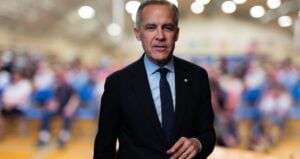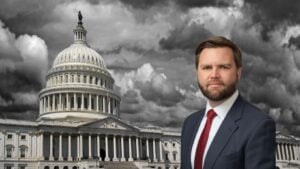Alberta Premier Danielle Smith told a Montreal business audience Monday that Quebec and Alberta are on the same side when it comes to resisting what she described as Ottawa intruding on provincial turf.
Speaking at the Chamber of Commerce of Metropolitan Montreal, Smith said both provinces are frustrated with a federal government that “wants to impose its will” and argued Canada needs to “get back” to a division of powers that respects exclusive provincial jurisdiction.
She added that Alberta respects federal jurisdiction but said the reverse is not happening.
Smith pointed to the federal government’s move to seek limits on how provinces can invoke the Constitution’s notwithstanding clause as a flashpoint.
Ottawa has told the Supreme Court of Canada it will argue for constraints on the clause’s preemptive use as part of the litigation over Quebec’s secularism law.
Smith said she supports Quebec’s preemptive use of the clause in that law, framing it as a defense of provincial autonomy.
The Justice Department confirmed last month that it is intervening at the Supreme Court on the issue.
Beyond constitutional jousting, Smith worked to recast Alberta and Quebec as economic partners.
She said central Canadian manufacturers could supply more of the specialized equipment Alberta currently imports from the United States, including coil tubing, drill bits, and steel pipe.
That pitch, delivered in front of Quebec business leaders, taps into a broader push to shorten supply lines, keep more value inside Canada, and give domestic suppliers a larger share of the oil patch’s procurement budget.
She also suggested Quebec should produce its own natural gas to reduce dependence on U.S. energy.
That would require a policy U-turn in Quebec, which in 2022 enacted a law that ended petroleum exploration and production in the province and rewrote statutes to focus only on gas storage and pipelines.
Any change to enable upstream development would have to contend with that statute, investor perceptions of legal durability, and community acceptance.
A cozier Alberta–Quebec relationship could translate into incremental orders for industrial suppliers in Ontario and Quebec if procurement shifts from foreign to domestic vendors.
It could also shape how service companies allocate capital for inventory and fabrication capacity east of the Prairies.
At the same time, the looming Supreme Court fight over the notwithstanding clause introduces a layer of legal uncertainty that executives will watch closely, since court guidance can affect how quickly provinces move on files from labor to education to energy infrastructure.
Smith tempered expectations on megaprojects, she told reporters she is not pushing a pipeline through Quebec “right now,” a nod to the political and regulatory sensitivities that have stalled cross-country projects in the past.
The immediate focus, she indicated, is pragmatic commerce between provinces rather than reviving the most contentious ideas on the national stage.
The premier’s message lands at a moment when provincial leaders are recalibrating their ties with Ottawa.
Whether the new rhetoric hardens into a lasting policy bloc will depend on court timelines, the federal response, and whether Quebec industry sees enough near-term upside in closer energy and equipment trade with Alberta to outweigh the political heat.




















